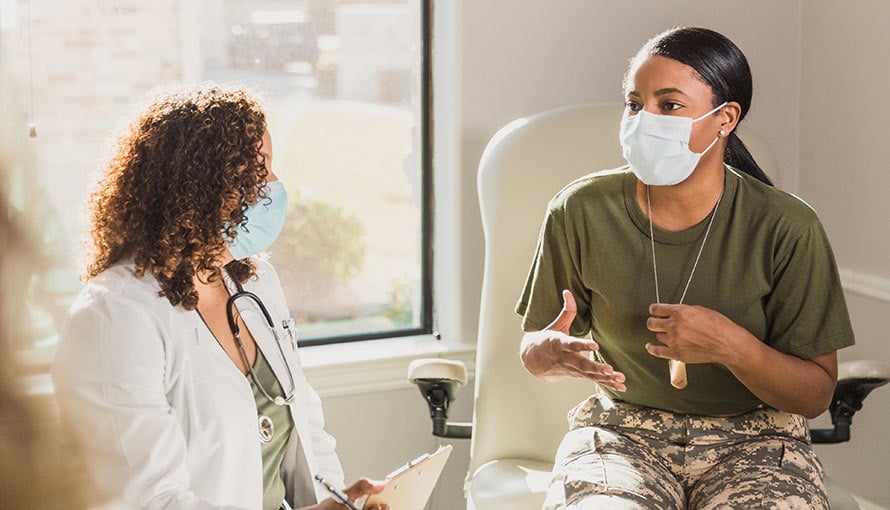HER2 Positive Breast Cancer Symptoms

The symptoms of HER2 (human epidural growth factor receptor 2) positive breast cancer are much like the symptoms of other breast malignancies. Most individuals with this form of cancer first notice a hard lump in a breast. Many breast lumps—the majority, in fact—are not cancerous, but it is still important to promptly speak with a physician if you notice a lump in one of your breasts.
What does a breast cancer lump feel like?
Feeling a lump in your breast can be an alarming discovery, but most changes to the breast are due to hormonal fluctuations. For example, your breasts may feel swollen, tender or sore during your menstrual period. A breast cancer lump is differentiated from normal hormonal changes in that it is:
- Hard
- Unevenly shaped
- Immobile
- Does not cause pain
A lump that causes pain may be caused by a breast abscess or mastitis while one that can be moved around easily is likely due to fibroadenoma, a common type of benign breast tumor.
What are some other signs of HER2-positive breast cancer?
There are three signs of HER2-positive breast cancer that should be brought to the attention of a physician immediately. These include:
- Nipple discharge
- Sudden nipple inversion
- Changes in the texture of the breast skin (similar to an orange peel)
Other signs of HER2-positive breast cancer include:
- Unusual breast swelling or tenderness
- Discomfort in a breast or nipple
- Redness or a thickening in a breast or nipple
About 20% of all breast cancers are HER2 positive. Still, every patient is different, and some HER2-positive breast cancer symptoms are not as obvious as others. As a general rule of thumb, you should consult with a physician if you spot any breast abnormalities. A physician will be able to determine the root cause of your symptoms and recommend an appropriate course of treatment, if necessary.
Can you have breast cancer without symptoms?
It’s possible to not have any symptoms of breast cancer, although that’s generally uncommon. Still, it does happen, which is why it’s important for women to receive an annual mammogram to be screened for breast cancer. The guidelines for mammograms include:
- Women ages 40 to 44 can begin receiving mammograms if they choose.
- Women ages 45 to 54 should receive yearly mammograms.
- Women ages 55 and older should receive mammograms every two years.
Women who are too young to begin breast cancer screening and those in between mammograms can complete monthly breast self-exams to check for any changes in their breasts.
How to perform a breast self-exam
Every woman should perform a monthly breast self-exam and report any breast abnormalities to their physician. These self-exams are not a replacement for annual mammograms, but rather used in addition to them so that women can promptly identify changes in between their preventive care visits. Here’s how to perform a breast self-exam:
- Stand in front of a mirror and place your hands on your hips.
- Carefully view your breasts in the mirror. Take notice of any swelling, puckering, dimpling, redness or bulges.
- Look at your nipples to see if there is any unusual discharge or nipple inversion.
- Raise your arms above your head and repeat the examination.
- Lay down on a couch or bed and use your left hand to feel your right breast. With a firm touch, use the pads of your pointer, middle and ring finger to feel around the entire breast.
- Do the same thing with your left breast, this time using your right hand.
- As a final step, stand up and repeat the process of palpating your breasts with your hands.
The best time to complete a breast self-exam is a few days after your menstrual period has ended and any associated breast swelling or tenderness has subsided.
Breast cancer diagnostics at Moffitt Cancer Center
The Don & Erika Wallace Comprehensive Breast Program at Moffitt Cancer Center offers a full spectrum of diagnostics, evaluation, specialized treatment and well-rounded supportive care services to patients with HER2-positive breast cancer. If you have any concerns about your breast cancer risk factors or have noticed any changes in your breasts, we encourage you to reach out to our team of experts. Our oncologists specialize in breast malignancies and can provide you with a prompt diagnosis and individualized treatment plan. In a single location, our patients have access to a wide range of therapies, including minimally invasive surgery, radiation therapy, chemotherapy, immunotherapy, targeted therapy and clinical trials. Plus, we provide many supportive care programs for our patients to help them through the emotional journey of cancer treatment.
To take your next step and request an appointment with a Moffitt oncologist specializing in breast cancer, submit a new patient registration form or call 1-888-663-3488. Your cancer diagnosis is a top priority for us, and you’ll be able to speak with a cancer expert as soon as possible.
